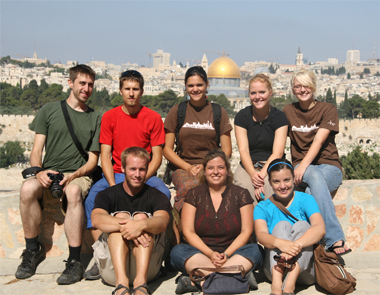Ben Davies, Franconia
bd1194@messiah.edu
 The sun had just finished its descent over Bethlehem and the call to prayer rang crisp in the evening air. I breathed in the sent of Arabic coffee mingling with olives and lime trees while sitting with Samir Sababa on the back porch of the Sababa house.
The sun had just finished its descent over Bethlehem and the call to prayer rang crisp in the evening air. I breathed in the sent of Arabic coffee mingling with olives and lime trees while sitting with Samir Sababa on the back porch of the Sababa house.
We were both sipping the warm coffee, which was really more like a shot of espresso than a cup of Maxwell House. Squinting into focus some whirring figures just past the low garden wall, I could make out the silhouettes of children piloting their bikes back and fourth on the neighbor’s crumbled patch of macadam. Although I could not understand their Arabic, it was enough to hear the joy in their laughter. “Surely this could not be the Palestine I have always imagined,” I thought to myself. Where were all the extremists and constant gun battles that the American news had told me about?
No, the only extreme I could find there on the porch was the deep brown of Samir’s Palestinian eyes which were staring off intently. He represents the fourth generation to live in that house and now shares it with his parents, Fáud and Louris. He is 28 and married, with a child of his own, Salina.
Samir had completed his undergraduate studies in engineering in his early twenties, but there was little work for him in that field in Palestine, so he works the days away in his fathers mechanic shop slaving over dusty engines. At night he comes home to work just as hard at being a father.
I remembered how, that morning, he had taken me to the unfinished second floor of the house. With an air of gauged accomplishment in his voice, he led me through the rough concrete walled structure holding the future for his young family.
“That room is for Salina and this one is the kitchen,” he pointed, as we stepped over some water and electric lines which dove down through a hole in the floor. I imagined the new space with its final coats of paint and tiled floors smooth with the satisfaction of living well.
Interrupting my thoughts, Samir said, “Here it is like a big jail.” I thought I understood what he meant, but quickly realized that I never really would, I couldn’t. For it was not the grey walls of his second story construction that he was referring to, but another wall, one whose height sprung just as far above the ground; only it served a much more strangling purpose.
“During the last intifada,” he said, “the tanks drove up our road. We had to leave, to hide in the city.”
With the immediacy in his voice I felt as though he half expected me to feel the ground beneath them shiver under the 65 tons of an Israeli Merkava Mark IV tank crawling just outside his bedroom window.

I followed his detached gaze to an oddly vacant lot across the alley. “They blew up our neighbor’s house,” he said, as he turned to measure the weight his words had on his silent listener. It was clear that the cold steel tread and the concussion of the 120mm shells still weighed heavily on Samir like a mallet of judgment for sins he had not committed.
I could still hear the laughter of the children on their bikes, only now it was layered by giggles and squeals coming from Salina. I caught a glimmer in Samir’s eye as he looked contentedly at his wife and daughter.
Then I began to understand that he was not driven by the fear and frustration of those memories, but by hope. His daughter was his hope, his wife and parents were also. They were the freedom and peace that no walls could smother and no tanks could crush.
Ben was a participant in the Franconia Conference and Mennonite Mission Network Youth Venture team to Nazareth Village. Ben and his wife Karah currently attend Messiah College. Ben is in his senior year studying Religion and Karah is a junior studying Nutrition.

To read more reflections from the Nazareth Village team (click here)
Photos by David Landis and Timoyer (Click here) to view more!
The opinions expressed in articles posted on Mosaic’s website are those of the author and may not reflect the official policy of Mosaic Conference. Mosaic is a large conference, crossing ethnicities, geographies, generations, theologies, and politics. Each person can only speak for themselves; no one can represent “the conference.” May God give us the grace to hear what the Spirit is speaking to us through people with whom we disagree and the humility and courage to love one another even when those disagreements can’t be bridged.
